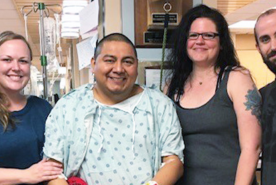About Polycystic Kidney Disease
Polycystic kidney disease (also called PKD) causes numerous cysts to grow in the kidneys. These cysts are filled with fluid. If too many cysts grow or if they get too big, the kidneys can become damaged. PKD cysts can slowly replace much of the kidneys, reducing kidney function and leading to kidney failure.
In the United States about 600,000 people have PKD, which is the fourth leading cause of kidney failure. Men and women are equally at risk for the disease. It causes about 5% of all kidney failure.
Signs and symptoms
Most people do not develop symptoms until they are 30 to 40 years old. About 25% of PKD patients have a so-called floppy valve in the heart, and may experience a fluttering or pounding in the chest as well as chest pain. These symptoms almost always disappear on their own but may be the first hint that someone has PKD.
High blood pressure is the most common sign of PKD. Occasionally, patients may develop headaches related to high blood pressure or their doctors may detect high blood pressure during a routine physical exam. Because high blood pressure can cause kidney damage, it is very important to treat it. In fact, treatment of high blood pressure can help slow or even prevent kidney failure.
- Back or side pain
- An increase in the size of the abdomen
- Blood in the urine
- Frequent bladder or kidney infections
- High blood pressure
- Fluttering or pounding in the chest
Causes
PKD runs in families. It is an inherited disorder that is passed from parents to children through genes. Genes are the basic elements of heredity. At conception, children receive a set of genes from each parent. They determine many characteristics such as hair color and eye color. Genes can also determine the likelihood of developing a disease.
A genetic disease can happen if one or both parents pass abnormal genes to a child. This happens through something called dominant inheritance or recessive inheritance.
Dominant inheritance
If one parent has the disease and passes an abnormal gene to the child, it is called dominant inheritance. Each child has a 50% chance of getting the disease. The risk is the same for every child, regardless of how many children develop the disease.
Recessive inheritance
If both parents carry the abnormal gene, and both parents pass an abnormal gene to the child, it is called recessive inheritance. In this situation, every child has a 25% chance of getting the disease.
Types
Autosomal dominant PKD
Also called PKD or ADPKD
This form of the disease is passed from parent to child by dominant inheritance. In other words, only one copy of the abnormal gene is needed to cause the disease. Symptoms usually begin between the ages of 30 and 40, but they can begin earlier, even in childhood. ADPKD is the most common form of PKD. In fact, about 90% of all PKD cases are ADPKD.
Infantile or autosomal recessive PKD
Also called ARPKD
This form of the disease is passed from parent to child by recessive inheritance. Symptoms can begin in the earliest months of life, even in the womb. It tends to be very serious, progresses rapidly, and is often fatal in the first few months of life. This form of ARPKD is extremely rare. It occurs in 1 out of 25,000 people.
Acquired cystic kidney disease
Also called ACKD
ACKD can happen in kidneys with long-term damage and severe scarring, so it is often associated with kidney failure and dialysis. About 90 percent of people on dialysis for 5 years develop ACKD. People with ACKD usually seek help because they notice blood in their urine. This is because the cysts bleed into the urinary system, which discolors urine.
Complications
Individuals with PKD who are concerned about passing the disease to their children may want to consult a genetics counselor to help them with family planning. Many university medical centers have this service.
Most women with PKD (80%) have successful and uneventful pregnancies. However, some women with PKD have an increased risk for serious complications for themselves and their babies, especially for those who also have:
- High blood pressure
- Decreased kidney function
About 40% of pregnant women with PKD, who also have high blood pressure, develop a condition called pre-eclampsia (or toxemia). This is a life-threatening disorder for both the mother and baby, and can develop suddenly and without warning. Due to this increased risk, women with PKD, particularly those who also have high blood pressure, should be followed closely during their pregnancy by their doctor.
PKD can affect other organs besides the kidney. People with PKD may have cysts in their liver, pancreas, spleen, ovaries, and large bowel. Cysts in these organs usually do not cause serious problems, but can in some people. PKD can also affect the brain or heart. If PKD affects the brain, it can cause an aneurysm. An aneurysm is a bulging blood vessel that can burst, resulting in a stroke or even death. If PKD affects the heart, the valves can become floppy, resulting in a heart murmur in some patients.
About 50% of people with PKD will have kidney failure by age 60, and about 60% will have kidney failure by age 70. People with kidney failure will need dialysis or a kidney transplant. Certain people have an increased risk of kidney failure including:
- Men
- Patients with high blood pressure
- Patients with protein or blood in their urine
- Women with high blood pressure who have had 3 or more pregnancies
Polycystic Kidney Disease
Looking for more info about PKD?
Join our kidney community for valuable tips and resources to support your PKD journey.
Diagnosis
Tests
Ultrasound is the most reliable, inexpensive and non-invasive way to diagnose PKD. If someone at risk for PKD is older than 40 years and has a normal ultrasound of the kidneys, they probably do not have PKD. Occasionally, a CT scan (computed tomography scan) and MRI (magnetic resonance imaging) may detect smaller cysts that cannot be found by an ultrasound. MRI is used to measure and monitor the volume and growth of kidneys and cysts.
In some situations, genetic testing might also be done. This involves a blood test that checks for abnormal genes that cause the disease. Genetic testing is not recommended for everyone. The test is costly, and it also fails to detect PKD in about 15% of people who have it. However, genetic testing can be useful when a person:
- has an uncertain diagnosis based on imaging tests
- has a family history of PKD and wants to donate a kidney
- is younger than 30-years old with a family history of PKD and a negative ultrasound, and is planning to start a family
Treatment
At present, there is no cure for PKD. However, a lot of research is being done. Recent studies suggest that drinking plain water throughout the day and avoiding caffeine in beverages can slow the growth of cysts. Research is also helping us understand the genetic basis of PKD.
Studies also suggest that some treatments may slow the rate of kidney disease in PKD, but further research is needed before these treatments can be used in patients. In the meantime, many supportive treatments can be done to control symptoms, help slow the growth of cysts, and prevent or slow down the loss of kidney function in people with PKD. These include:
- Careful control of blood pressure
- Prompt treatment with antibiotics for bladder or kidney infection
- Drinking lots of fluid when blood in the urine is first noted
- Medication to control pain (talk to your doctor about which over-the-counter medicines are safe to take if you have kidney disease)
- Healthy lifestyle with regard to quitting smoking, exercise, weight control and reduced salt intake
- Drinking lots of plain water throughout the day
- Avoiding caffeine in all beverages
Medication
In April 2018, the FDA approved a new drug called tolvaptan for the treatment of autosomal dominant polycystic kidney disease (ADPKD). The drug can be used to help slow kidney function decline in adults at risk for this type of PKD. You can speak with a healthcare professional for more information about this treatment and to see if it’s right for you.
Nutrition
At present, no specific diet is known to prevent cysts from developing in patients with PKD. Reducing salt intake helps control blood pressure in patients with PKD who have high blood pressure. A diet low in fat and moderate in calories is recommended to maintain a healthy weight. Speak to your doctor or a dietitian about other changes to your diet, such as avoiding caffeine.
Preparing for your appointment
In addition to your primary care doctor, you should also find a nephrologist who has experience treating patients with PKD. You and your healthcare professional can work together to choose treatment options that are best for you.

Questions to ask
You and your healthcare professional will need to work together to make treatment choices that are best for you. Here are some questions to help you begin a discussion. It is helpful to write your questions down before your appointments, and bring the list with you. Doing so will help you make the best use of your time together.
- Do I have PKD?
- What type of PKD do I have?
- Does my PKD affect any other organs?
- Can my PKD be cured?
- What are my treatment options?
- How long will treatment last?
- Are there any risks or side effects associated with my treatment?
- Should I also see a nephrologist (kidney doctor)? Will you be partnering with a nephrologist about my care?
- How much experience do you have treating PKD?
- Are there any clinical trials I should think about?
Resources
National Kidney and Urologic Disease Information Clearinghouse (NKUDIC), a service of the National Institute of Diabetes, Digestive and Kidney Diseases.
800.891.5390
Polycystic Kidney Disease Foundation
8330 Ward Parkway, Suite 510
Kansas City, MO 64114
(800) PKD-CURE
This content is provided for informational use only and is not intended as medical advice or as a substitute for the medical advice of a healthcare professional.








